State laws force a complete shutdown of Carrillo Grind
Carrillo grind students working (Maxine Salvador, The Puma Prensa)
By Maxine Salvador, business manager
Maria Carrillo High School’s first ever student run cafe on campus called Carrillo Grind (or “the Grind”) was a smashing success serving the school community. Due to both staff and students' desires to purchase refreshments like coffees or teas as well as the popular Carrillo Boost energy drinks, the community took pleasure in stopping by the cafe during chilly mornings before school and during break. Long lines and the excitement surrounding the enterprise made for a wonderful and friendly environment that students had grown to love, resulting in great disappointment amongst the community when they learned about the Grind’s unforeseen shutdown in early March.
On March 1, 2023, Trisha Terrell, Pathway Academy for Work and Service (PAWS) English teacher, received an email including language from the board’s rules and state’s laws pertaining to food sales on campus, along with news regarding the shutdown of Carrillo Grind. “I understand it, and I wouldn’t want our school to get in trouble or be out of compliance,” said Terrell. Despite the shock many students felt surrounding the news, according to Terrell, “If it’s a state educational code or law, we’re pretty much expected to follow them unless there’s some sort of exception that can be made.”
Carrillo Grind selling caffeinated beverages to students during school hours was a violation of state laws. According to the California School Nutrition Association’s “Summary of Requirements for Foods & Beverages Sold in California Schools,” the guidelines state:
Standards for beverages sold in high schools, effective July 1, 2009; in the interim, effective July 1, 2007, the following requirements must be met for no less than 50% of all beverages sold (Ed. Code 49431.5).
Only the following beverages* may be sold to a pupil at a high school from one-half hour before, to one-half hour after, the school day.
• Fruit-based drinks that are composed of no less than 50% fruit juice and have no added sweetener (added sweetener is any additive that enhances the sweetness of the beverage, including added sugar or artificial sweetener, but does not include the natural sugar contained within the fruit juice).
• Vegetable-based drinks that are composed of no less than 50% vegetable juice/s and have no added sweetener.
• Drinking water with no added sweetener.
• Two-percent-fat milk, one-percent-fat milk, nonfat milk, soy milk, rice milk, and other similar nondairy milk.
• An electrolyte replacement beverage that contains no more than 42 grams of added sweetener per 20-ounce serving.
Prior to the COVID-19 pandemic, Carrillo Grind was a functioning business on the MCHS campus selling caffeinated beverages, but only to staff and administrators. Since the Grind’s reopening from late 2022 to now, beverages were being served to students as well, which is out of compliance with state laws.
Principal Monique Luke recognizes an act of misjudgment on administrators’ end when they approved Carrillo Grind’s operation on campus without knowing which beverages can be sold during school hours and to whom. “It’s my second year here. When Carrillo Grind was brought to [my attention] and [I was told] it was something that was done before, I trusted that everything now was what was done before,” said Luke. She adds how her intent to re-approve the Grind’s operation on campus was to not only support the business, but to bring the community together as well. “I’m not against them selling—being in compliance with the policy and selling to teachers—but just not to students,” she said.
With Carrillo Grind operating under the PAWS program, and the enterprise no longer being in practice, Terrell’s English class faces difficulties regarding how to respond. “We haven’t yet figured out how to pivot; everything has come to a grinding halt,” said Terrell.
Currently, the students in the PAWS English class are brainstorming ways to sell their beverages to students on campus. The state guidelines only approve activity 30 minutes prior to and 30 minutes after the school day for outside beverages to be sold.
Denise Garcia, senior, volunteered her time to work for the Grind and was sad to see it go so soon. “I was shocked and surprised and confused because I thought we had gotten approved for everything that we were doing, but there was some misinformation and miscommunication.” Despite this, she said, “We’re being very understanding about it because it’s the state; it's their rules.” Garcia and her peers continue to come up with ways to promote the Grind and resume business. “We thought about having a tailgate party for seniors or upperclassmen… and have a boost cart out there for them to try.”
Senior Nina Soto was another active member of the Grind team. “It was kind of upsetting. It was a fun experience because we were actually learning real job experiences.” She, as well as other students, felt disappointed and disheartened to learn that the Grind can no longer serve students during the school day.
Despite it all, both staff and students continue to persevere and navigate around this big change. “This is a good learning opportunity for students. In business, if there are rules, you need to make sure you know what they are and that you follow them,” says Terrell.
Amani Davis, another senior and strong contributor to Carrillo Grind, expresses disappointment towards the closing of the enterprise, but she appreciates the impact it left on students. Throughout her experience with Carrillo Grind this school year, Davis proudly claims: “It wasn’t just a ‘Carrillo Grind’ thing, it’s a ‘Maria Carrillo’ thing.”

